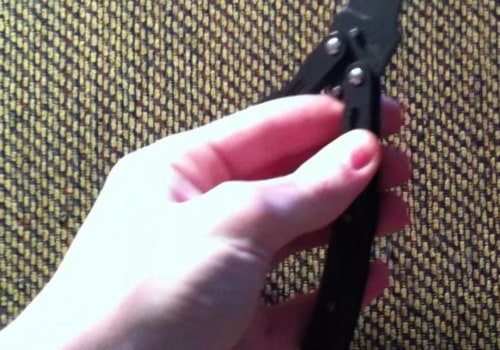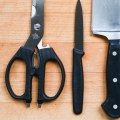When it comes to buying tactical and collectible knives, it's important to make sure you know what you're looking for. Whether you need a knife for self-defense, hunting, or as a collectible piece, there are certain factors to consider when making a purchase. In this article, we'll explore some tips for buying tactical and collectible knives so that you can make an informed and confident purchase. First, consider the knife's purpose. If you're looking for a knife for self-defense, then you'll want to choose one that is strong and durable enough to protect yourself in a dangerous situation.
If you're looking for a hunting knife, then you'll want to make sure the blade is sharp and the handle is comfortable to hold. For a collectible piece, look for something that is both aesthetically pleasing and well-made. Next, take into account the quality of the materials used in the construction of the knife. High-quality stainless steel blades are more durable and resistant to rust and corrosion than cheaper alternatives. The handle should also be made from a material that is comfortable to hold and won't slip during use. Finally, consider your budget.
While it's important to get a good quality knife, don't forget that quality doesn't always have to come at a high cost. There are many well-made knives available at reasonable prices that won't break the bank. These are just a few tips for buying tactical and collectible knives. With the right information and research, you can be sure that you make an informed and confident purchase. Buying tactical and collectible knives can be an exciting and rewarding experience. But it requires knowledge about the different types of knives available, where to find them, and how to assess their quality.
This guide will provide you with all the information you need to make an informed purchase of tactical and collectible knives. First, it's important to understand the difference between tactical and collectible knives.
Tactical
knives are designed for a specific purpose such as self-defense, while collectible knives are designed primarily for display or collection purposes. The next step is to decide where you want to buy your knife. There are many online retailers that specialize in selling tactical and collectible knives.You can also find them in specialty stores or at flea markets. When assessing the quality of a knife, it's important to look at factors such as the handle material, blade type, weight, and sharpness. It's also important to consider the reputation of the manufacturer and check customer reviews before making a purchase. Additionally, it's important to know the local laws regarding the purchase and ownership of knives. Finally, make sure you store your knife safely and keep it properly maintained. Make sure you clean your knife after each use and store it in a dry place.
If you use your knife for survival purposes, make sure to practice proper knife safety techniques such as never pointing the knife at anyone, keeping your fingers away from the blade, and not trying to catch a falling knife. Buying tactical and collectible knives can be an enjoyable experience if you do your research and make an informed decision. With a little bit of knowledge and preparation, you can find a quality knife that will last for years to come.
Sources for Buying Tactical and Collectible Knives
When looking for tactical or collectible knives, it's important to consider the various sources available. Online retailers are a great way to find a wide selection of knives at competitive prices. Specialty stores can provide expert advice on choosing the best knife for your needs.Flea markets can be a great place to find vintage or rare items at lower prices. However, it's important to thoroughly inspect any knives you're considering before making a purchase.
Assessing Quality
When assessing the quality of a knife, it's important to look at factors such as the handle material, blade type, weight, and sharpness. The handle material should be strong enough to withstand wear and tear, as well as any environmental elements it may be exposed to. The blade type should match your specific needs, whether it is for hunting, camping, or everyday carry.The weight of the knife should be considered, as carrying a heavy knife can be uncomfortable. Lastly, the sharpness of the blade should be assessed to ensure it is up to your standards. Researching the company will give you an idea of their quality standards and customer service. Reading through customer reviews will provide you with valuable insight into the product you are considering and can help you make an informed decision.
Storing and Maintaining Your Knife
Once you've made your purchase, it's important to store your knife safely and keep it properly maintained.It's important to store your knife in a cool, dry place and make sure it is away from direct sunlight or other sources of heat. Regular cleaning and oiling of your knife is essential to keep it in good condition. You should wipe down the blade with a soft cloth and oil it regularly to prevent corrosion. Make sure you use an oil specifically designed for knives, as regular household oils can damage the blade. It's also important to sharpen your knife regularly. This will help keep the blade in top condition and ensure that it remains sharp and ready for use.
Use a sharpening stone or steel rod to sharpen the blade, but be careful not to damage the edge. By following these tips, you'll be able to enjoy your tactical and collectible knives for years to come.
Local Laws
Before buying a knife, it is important to make sure you understand the local laws regarding the purchase and ownership of knives. Depending on the area you are in, there may be restrictions on what types of knives can be bought or carried in public. For instance, some areas may prohibit certain types of knives or restrict their use in certain places. Additionally, laws may also limit the size or length of knives that can be carried in certain places.It is important to research the local laws before making a purchase to ensure you are not breaking any laws. It is also important to consider that even if a knife is legal to buy in your area, it may still be illegal to carry it in certain places. It is important to familiarize yourself with the local laws and regulations on carrying knives so you don't get into legal trouble. Additionally, it is important to check if there are any age restrictions associated with purchasing or carrying knives, as it is illegal for minors to own certain types of knives. If you plan on using the knife for self-defense purposes, it is important to check your local laws regarding the legality of carrying a knife for self-defense. Furthermore, if you plan on using the knife for hunting or other outdoor activities, you should make sure that the type of knife you are purchasing is allowed for use in those activities. Tactical and collectible knives can be an enjoyable part of any collection or self-defense arsenal.
It is important to do your research when deciding on a knife, from the type of blade to the source of purchase. When assessing quality, look for a reputable brand and make sure that the knife is well-balanced and constructed from high-grade materials. Additionally, before making a purchase, be sure to understand the local laws and regulations regarding knives. With proper care and maintenance, your knife will last for years to come.







Leave Reply